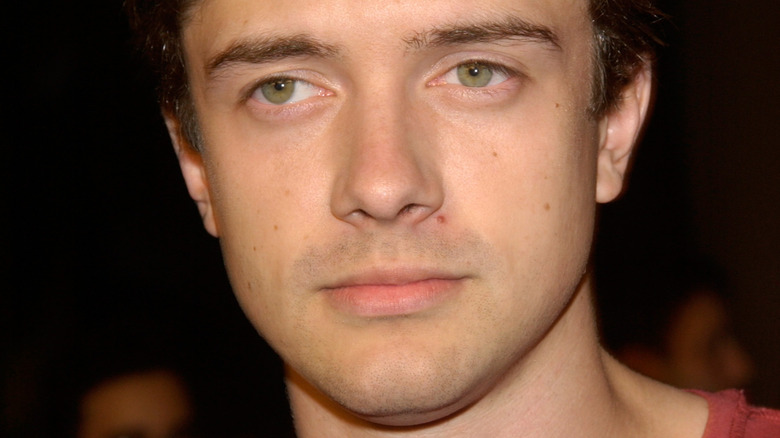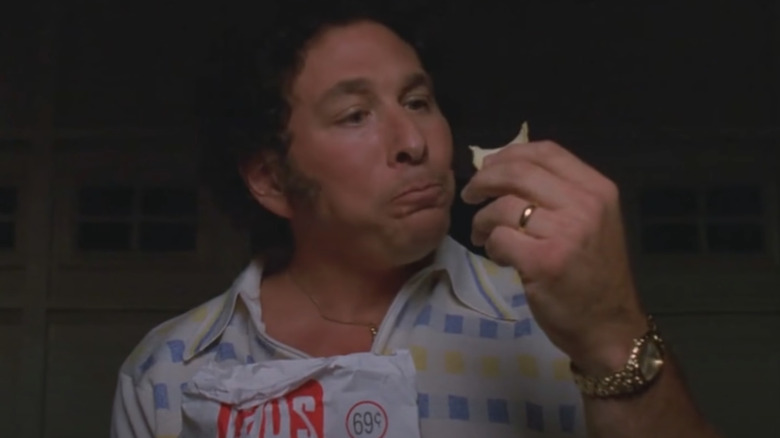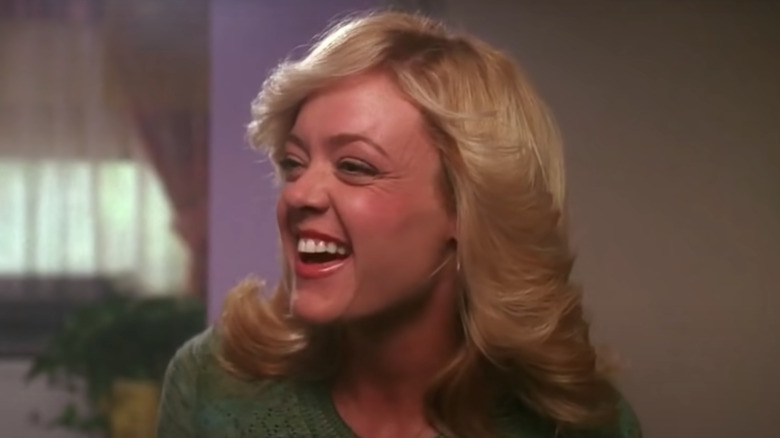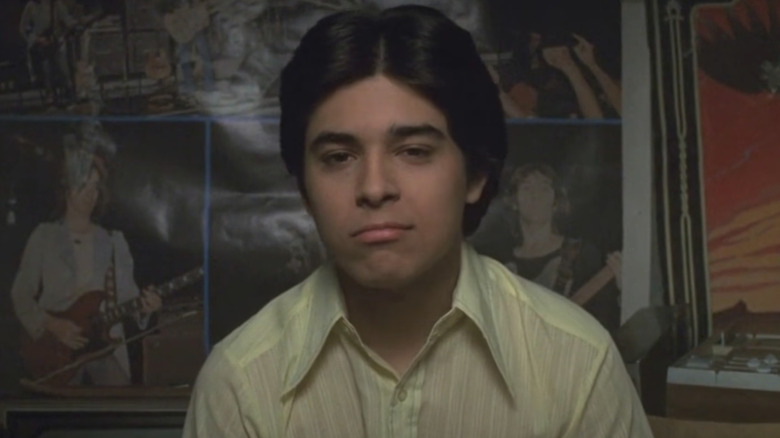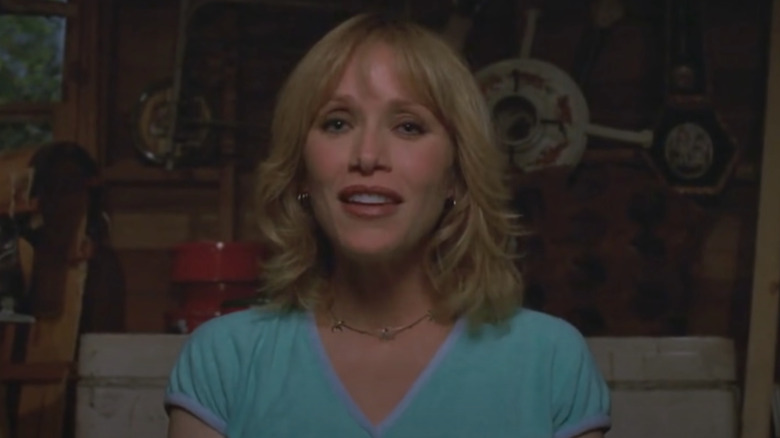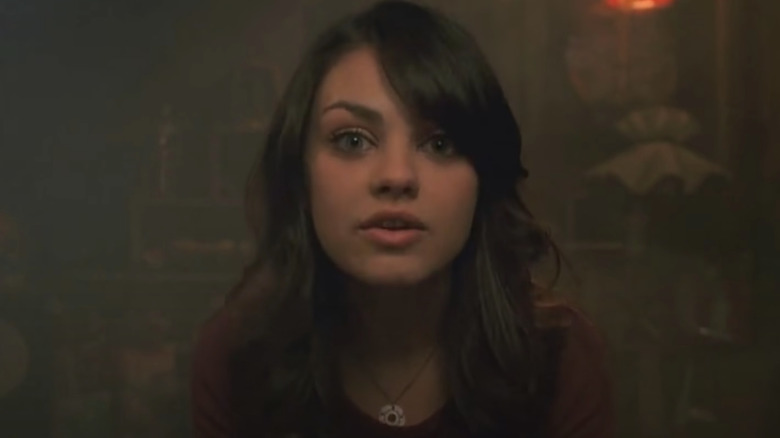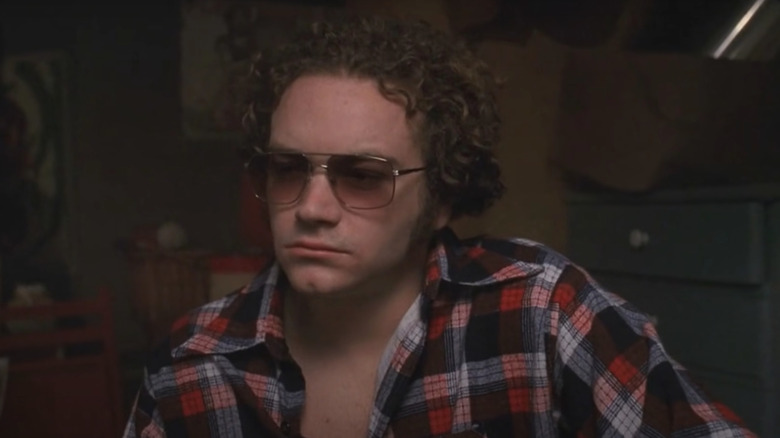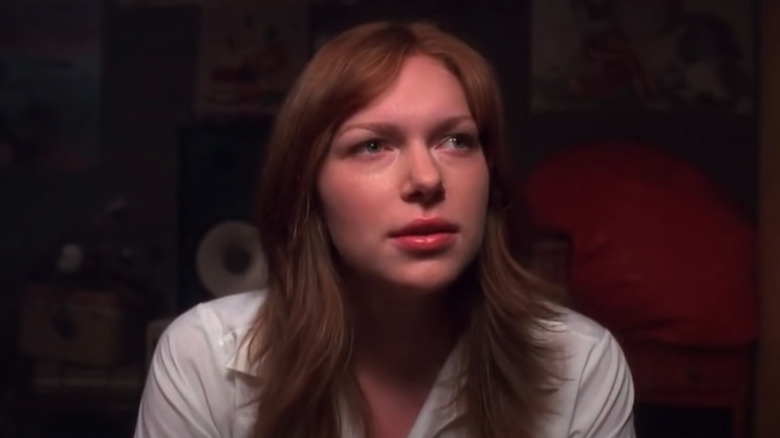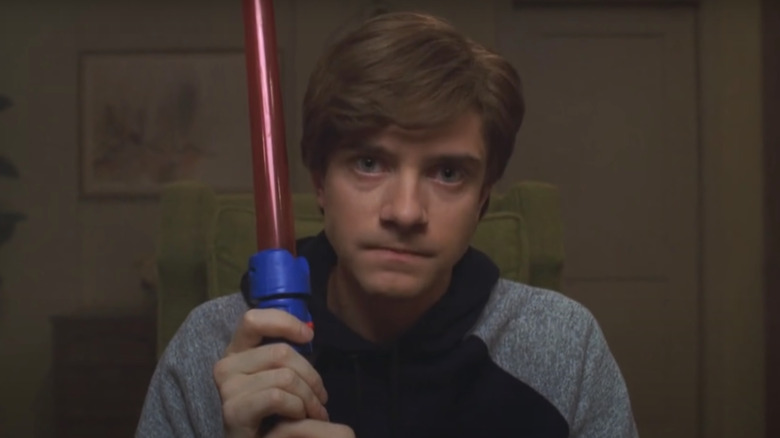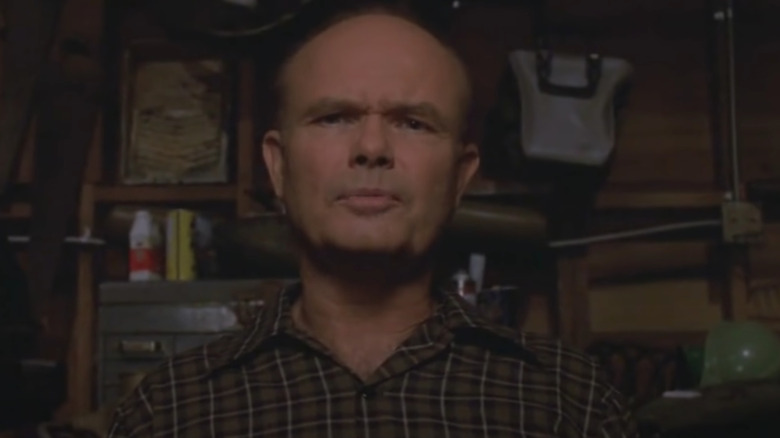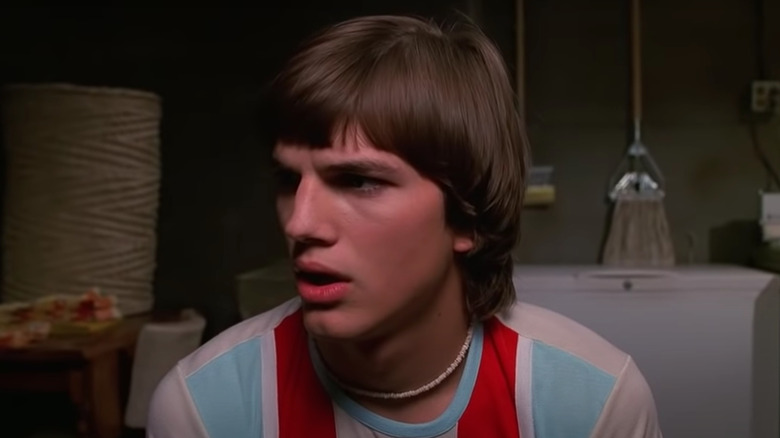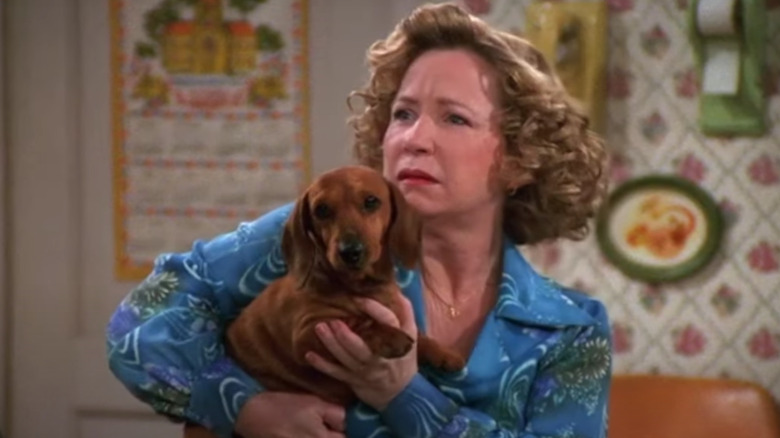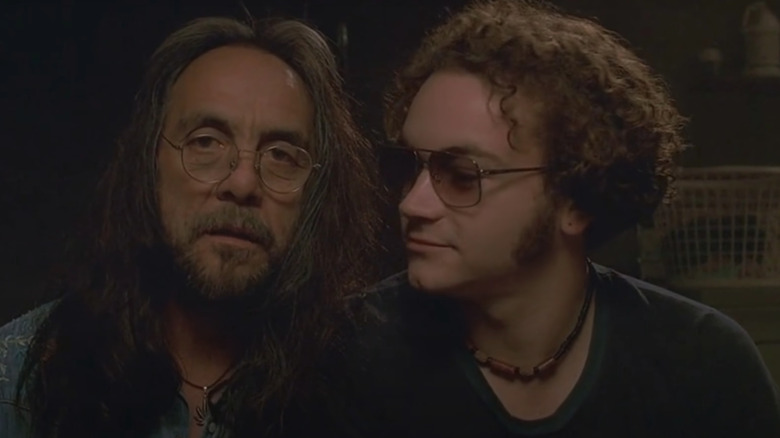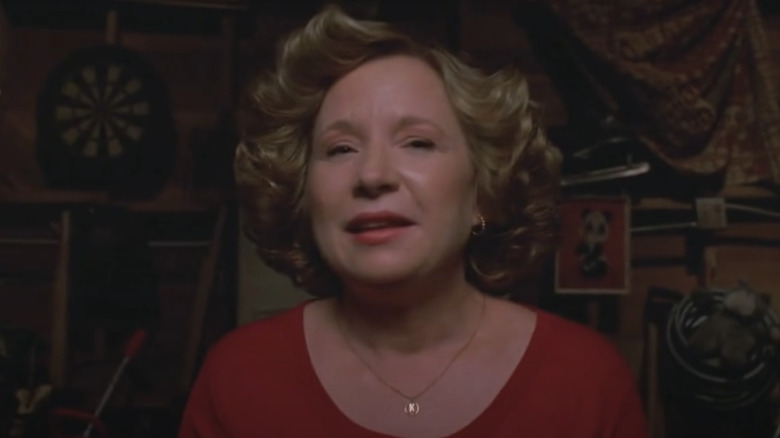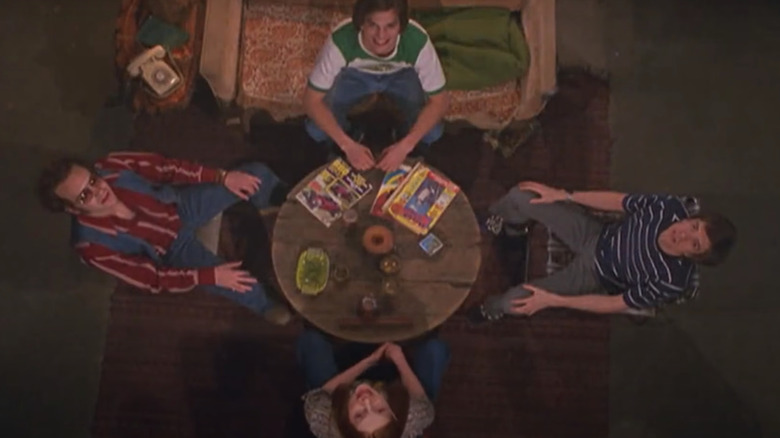That '70s Show Main Characters Ranked
There are few shows that accurately depict life from a decade gone by while capturing the hearts of newer generations, but "That '70s Show" is one that gets the nostalgia factor just right in its combination of relatable humor and authentic details from the disco era. At its core, the popularity of the beloved comfort series is thanks to the hilarity and range of its many characters, their different personalities, and varying styles of humor.
While Topher Grace's Eric Forman technically takes the title of the main character, all of the regular faces that show up on "That '70s Show" have a kind of main character energy of their own. That's not to say that they are all likable, though, as pretty much each regular character has a pitfall or two that not only makes them more complex, but more human as well.
"That '70s Show" created some stars who went on to do awesome work, and it also launched a few actors whose careers have been plagued with controversy. In a lot of cases, though, they are still largely remembered for their roles in this nostalgic sitcom. We have taken a deep dive into the good and the bad of the characters from the show and ranked them from worst to absolute best.
13. Bob Pinciotti
Coming in at the bottom of the barrel is Bob Pinciotti. Don Stark played Donna's overbearing and all-around cringe-inducing father whose arguable best trait is that he really annoys Red. His interactions with the Forman family patriarch are regular sources of amusement, but otherwise, Bob is a character who is very much reflective of the misogynistic side of the '70s.
He is downright abhorrent to his wife Midge who is wildly out of his league and has raised his daughter to be a relatively grounded and strong woman despite her father's rampant sexism. This, thankfully, eventually leads to Midge leaving Bob. He has an ever-so-slight redemption arc after he is left to finish raising Donna on his own, but honestly, he is still a character we may have been destined to dislike. The minuscule characteristics that comprise what passes for Bob's good side are just not enough to cure his case of worst character syndrome.
12. Laurie Forman
Laurie is one of the only downright devious and mean-natured characters of "That '70s Show" and the closest thing the show has to a villain, so it should come as no surprise that she falls somewhere near the bottom of these rankings. She rises above the bottom spot because she tells some pretty killer jokes and her character effectively causes chaos and shakes things up within the central friend group.
The factor that cements her place near the bottom of the "That '70s Show" totem pole, though, is her inconsistent presence throughout the series. Laurie was recast in Season 6, apparently due to some personal hardships that the actress Lisa Robin Kelly struggled with in real life.
Even though Laurie isn't seen on screen after Season 6, she is mentioned a number of times as existing off-screen. The character's on-and-off nature never really gives viewers any sense of stability or closure with the character, which is a shame as she is a great foil to her brother Eric.
11. Fez
While Fez certainly garners plenty of laughs from viewers, he takes a hit on this list due to his real-life counterpart Wilmer Valderrama's problematic dating history, especially when it comes to pop stars. He's even publicly bragged about supposedly taking "This Is Us" star Mandy Moore's virginity during an interview with Howard Stern (via E!), a claim Moore subsequently denied. At the time they were dating, Moore was in her mid-to-late teens while Valderrama was in his early 20s. Years later, a 29-year-old Valderrama dated Demi Lovato when she was just 17 years old. Lovato seemingly called out this behavior with her song "29." It's not a great look for Valderrama.
Unfortunately, Valderrama's questionable personal track record is right on brand for his "That '70s Show" character. Fez is depicted as creepy, frequently hiding in Donna's closet to peep on her and routinely saying inappropriate things to many of the show's female characters. While the character could have once been perceived as endearing and innocently flirty, today folks might ask themselves, "Is Fez a sexual predator?" due to his majorly icky vibes.
10. Midge Pinciotti
At face value, Midge should have been an amazing character, and at some base level, she is. She was played by a former Bond girl and "Charlie's Angels" star Tanya Roberts, which is completely awesome. Midge even has some serious scenes of wisdom when it comes to parenting moments between her and Donna. The way she was written, though, is a real bummer.
Instead of coming off as a strong female character, Midge is depicted as the scatterbrained housewife of a regressive meathead who isn't much more than candy on his misogynistic arm. A lot of jokes come at her expense, as other characters tend to poke fun at her ditziness, or they just outright sexualize her. Midge's potential is mostly wasted, which is painful to witness during a rewatch of the series.
Midge certainly has her moments, like during private moments between her and Donna, usually when Donna is in need of some womanly guidance. A high point is when Midge takes back control of her life and leaves Bob, but even that wasn't a purposeful writing choice as Tanya Roberts left "That '70s Show" to take care of her sick husband. Her character comes off as underdeveloped and more of a trope than anything else. For that, she occupies a low spot on our list.
9. Jackie
There are plenty of reasons to dislike Jackie from "That '70s Show" – she is superficial, shallow, and can sometimes be just plain mean. However, she undergoes some of the most substantial character development out of anyone in the series. She transforms from a vain, spoiled, and somewhat whiny girl into a young adult who loves harder than anyone else and is beyond loyal.
Jackie, famously played by Mila Kunis, is also a pretty relatable character. Despite her self-involved exterior, at her core, she is just someone who wants to be loved and involved in the group. She uses her vanity and privileged upbringing as a weapon, as she thinks it is what gives her value. However, she very deliberately keeps inserting herself into the lives of each member of the central friend group and eventually makes a comfortable home there as a vital member of the gang.
It seems as though Jackie was initially written as an antagonist who would slowly creep under fans' skin, just as she does the other central characters in the series. While she still gets a relatively crummy ranking, Jackie is definitely a character with some heart and adds a lot to the series.
8. Hyde
The dilemma with ranking Hyde is even more complicated than the character himself. Hyde is one of the best characters in the show and, like Jackie, evolves throughout the series. Hyde is a rough-around-the-edges dude who blooms into a caring and protective friend. He's also a solid source of laughs and has a cool, likable personality. He would have easily landed on one of the highest spots on the list if it weren't for some pretty heinous allegations made against his real-life counterpart Danny Masterson. The sexual assaults he's been accused of would have occurred around the same time he was playing Hyde.
As far as the character of Hyde goes, though, he is morally sound in that particular area. Hyde may come off as a sarcastic jerk, but he would likely beat the living stuffing out of anyone who would commit Masterson's alleged crimes. Even so, it can be hard to separate a character from the person who portrays them. This is why Hyde can be found in the lower half of the rankings, though he would have been a tough one to beat if we compiled this list before we knew about the allegations against Masterson.
7. Donna Pinciotti
Like all the characters in the main friend group of "That '70s Show," Donna has some not-so-great qualities. She isn't always the nicest individual, and she can be a bit judgmental. However, she is probably the most stable of the bunch. She doesn't mind some fun, but she'll speak her mind even when it doesn't align with what her friends think or match the general consensus of the era.
Donna accomplishes what her mother Midge does not — she becomes an independently and openly strong woman who can stand up for herself and what she thinks is right. While Midge is a budding feminist, Donna takes her progressive mindset a few steps further and becomes an outright feminist queen.
"That '70s Show" is basically a period-based coming-of-age story with Eric and Donna's relationship at the center. The theme of coming into maturity kind of forces us to forgive some of the more childish mistakes the characters make, but Donna tends to repeat mistakes throughout the entire series and never really learns along the way. For example, she gets jealous of pretty much anyone Eric talks to during the couple's many breakups. Not only does she put up with some really unacceptable behavior from Eric, but she also dates unlikeable characters like Michael Kelso's somehow grosser brother Casey and Randy the replacement Eric. Now and again, Donna compromises on her intelligence and feminist ideals, so she loses a few points.
6. Eric Forman
If we had to pick a main character on "That '70s Show," the obvious answer is Eric. The majority of the series takes place in his family's home, the basement of which is the primary hangout spot for the friend group. But even though he's the central figure, Eric gives off the least amount of main character energy out of pretty much any of the characters. While he is typically bouncing back and forth between being extremely likable to extremely irritating, the majority of his comedic moments and personality come from the people he hangs out with.
He is a true chameleon, and his good and bad sides seem to cancel each other out, creating a truly neutral character surrounded by the chaos of other people. Despite Eric's general state of middle-groundedness, the show suffers from his loss; The Washington Post points to Topher Grace's exit as one of the low points of the series.
For these reasons, he is truly stuck in the middle-most position on this list. Eric is neither great nor terrible — he merely exists.
5. Red Forman
Despite being a pretty awful father to Eric as far as emotional stability is concerned, Red Forman is an overwhelmingly beloved character and is returning in a big way as one of the central characters of "That '90s Show." He is basically the poster boy for hardass fathers, and consistently delivers solid gags that stay surprisingly hilarious throughout the entire series.
While it's hard to imagine anyone other than Kurtwood Smith behind the character, Red Froman was almost played by Chuck Norris, who rose to popularity in the '70s and was near the height of his career around the time the fictional events of "That '70s Show" take place. The presence of the martial arts star would have made a cool metatextual reference, but Smith's performance is more than worth the tradeoff. Red's no-nonsense attitude serves as an essential counterbalance to the almost-entirely-nonsense attitudes of Eric and the gang.
4. Michael Kelso
Let's just start by saying that Michael Kelso is an awful person. He is manipulative, selfish, and just an all-around bad friend. He frequently hits on –and even occasionally tries to grope– Donna, Donna's mother, and even Eric's villainous sister. Kelso openly cheats on Jackie and desperately tries to get out of being a father to the baby he has with Brooke.
Despite the dismal state of his karma, though, Kelso is one hell of an entertaining character. According to Reddit users, he is the funniest character on the show, beating out all the competition by more than double when called to a vote. He is also a source of many unique conflicts that take place in the series, urging the show forward with compelling storylines in which he is usually the immature and impulsive troublemaker in the situation. Even so, he is usually forgiven pretty quickly due to everyone perceiving him as simple-minded.
Michael Kelso may hit on his friends' family members, behave in a way that's entirely oblivious to how his actions affect the people who care about him, and almost always rejects any sense of responsibility or accountability, but he makes for some pretty great TV. Given his vanity, it's fitting that he's sitting pretty near the top of our ranking.
3. Schatzi
Is it a little weird that a dog who only shows up in two out of eight seasons of "That '70s Show" beats out the majority of main characters on the series? Maybe, but if we could have rationalized placing Schatzi, the emotional support dog Red gets Kitty to help with her menopause-induced mood swings, at the top spot, we totally would have. Where almost all the other characters have less-than-savory sides that dock them a spot or two on the rankings, Schatzi has nothing of the sort. He is a very good boy ... well, except for the barking.
Schatzi disappears from the series for Season 6, the explanation being that he's hiding under the house. The absence must have been felt, though, as he returns for Season 7. In fact, Reddit has a soft spot for the dachshund and a meme of the dog was posted on the platform under a post wishing for more screentime for the lovable dog.
The canine adds a cute running joke to the later seasons of "That '70s Show," making appearances basically just to remind viewers that he exists. Also, the fact that Red comes to love — or tolerate — Schatzi seemingly more than his own son is a priceless continuation of his gruff treatment of Eric.
2. Leo
One of the only pure human souls in "That '70s Show" belongs to Leo, the laidback hippie who owns the Fotohut where Hyde works. He's fittingly played by '70s and stoner icon Tommy Chong (of Cheech and Chong) and is a relatively frequent, albeit sporadic, recurring character throughout the series. On the occasions when he can remember what he was just talking about, he adds a calm presence as well as some genuinely great energy to the central maturing teens.
His good nature lightens up the harsher edges around some of the characters, especially Hyde. Leo becomes like a second father to Hyde in their time "working" at Fotohut. As the series progresses, Leo becomes more of a central character who fills the voids left when members of the main cast stepped away. Leo is returning for "That '90s Show" and as one of the only genuinely kind and well-meaning characters, he gets very close to the top rank.
1. Kitty Forman
Although her son is the actual main character, Kitty Forman, drink in hand, steals the show with her iconic laugh pretty much any time she has a scene. She is one of the most complex characters and has so many different sides to her that it's hard to keep up some of the time. Her doting on Eric is the perfect foil to Red's constant criticism of him and evens out their family dynamic pretty perfectly.
Her interactions with other characters are also interesting. Despite the fact that she plays a pretty awesome mom, she is somewhat of a wild card when it comes to everyone else. She treats those she takes under her wing, like Schatzi and Hyde, more or less the same way she treats Eric. Meanwhile, she has a strained relationship with Donna, and even her own daughter isn't one of her favorite people. Like the great mom she is, though, Kitty is accepting of everyone and keeps her home open to everyone who passes by her doors.
In fact, it could potentially be her seemingly open-door policy that turns Eric into the main character in the first place. The Forman home is the place to be, and it's clear that Red's charming personality is not the reason everyone flocks to the residence. "That '70s Show" wouldn't be the same without her, and our spot for best character belongs to Kitty.
Honorable Mention: The Circle
While not a character per se, the smoke circle that makes at least one appearance in most episodes of "That '70s Show" is a vital part of the program. The circle brings the characters together regularly to build a bridge to the viewers and let them know what everyone is up to at that point in the episode. All of the ranked characters in our list appear in the circle — yes, even Schatzi — and the almost ceremonial act clearly helps create and strengthen bonds.
The creators implemented the circle as a way to show the characters smoking marijuana without explicitly talking about the drug, which as Topher Grace noted in a Los Angeles Magazine interview, was a big no-no for network TV at the time. What resulted from that stroke of brilliance is an iconic part of the series that spans its entirety and became somewhat of a character itself.
